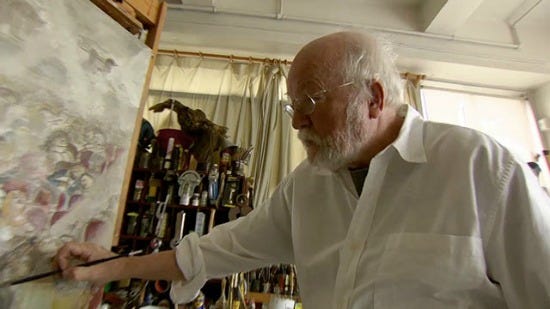Art Bastard

Robert Cenedella is so much of an artistic rebel, even the avant garde crowd treated him with disdain … or rather, he treated them so. “Art Bastard” is a documentary about a painter whose work cannot be classified, mostly because he refuses to accept any labels.
"Jeff Koons, he has a vacuum cleaner. Now it's art. At some point it's going to become just a vacuum cleaner again,” he says. “That's really where we're at at this point. The question isn't what is art. The question is what isn't art."
Writer-director Victor Kanefsky offers this probing look at Cendedella, now in his mid-70s, who managed to become controversial without ever really getting famous. Indeed, many of the interviews are with art experts or journalists talking about how trends come and go, a certain type of art becomes “hot” and then not, but Cenedella is as constant as the Northern Star, even as his aesthetic invariably evolves with the decades.
His paintings seem cartoony and even amateurish at first glance, specializing in large scenes with lots of faces and things going on, clashing and collaborating against an urban backdrop. It’s reminiscent of old-time political comic strips. But Kanefsky’s camera looms in closer and tracks across the images like a travelogue of a landscape.
This documentary explores Cenedella like a country with hidden vales and mysteries.
There is the rote biographical stuff: Cenedella grew up in a dysfunctional family in the 1950s, a weak father and a drunken mother. His dad, a prominent radio writer, was blacklisted for refusing to testify during the McCarthy hearings, and his subsequent upbringing was filled with poverty and anger. He was expelled from high school for refusing to sign a loyalty oath.
From there he wandered to the Art Students League of New York — putting himself through school by selling “I Like Ludwig” pins — where he came under the tutelage of George Grosz, a German Expressionist master. His skill and his taste for art grew like flower buds opening to the sun.
Cenedella was associated with the Pop Art movement for about a minute-and-a-half, but he ultimately rejected the tongue-in-cheek treatment of commercial products as art like Andy Warhol’s crowd. Similarly, he discards pure abstraction like Jackson Pollock as “half a painting,” all technique without purpose.
He started to gain notoriety for his cheeky paintings, sometimes political, always personal. A rendering of Santa Claus crucified on the cross brought him no new friends. He would receive commissions and then have his art rejected for display. Cenedella just kept painting, experimenting with other styles and forms, such as a scenic painting two inches wide and five feet tall.
The film explores the artist from stem to stern, gets inside his head a little, provides a glimmer of his mischievous soul. There is happiness and fulfillment, such as his obvious loving relationship with his middle-aged son. And nearly incomprehensible tragedy and confusion, such as learning that his father was not his biological parent, but the man who was didn’t show any more skill at being a dad than the ersatz one.
Today Cenedella is back at the artists’ league, teaching in the very same classroom where his mentor trained him, passing along his skill and passion to others. “Art Bastard” is a portrait of the artist as an old man, still fiercely independent and alive.



